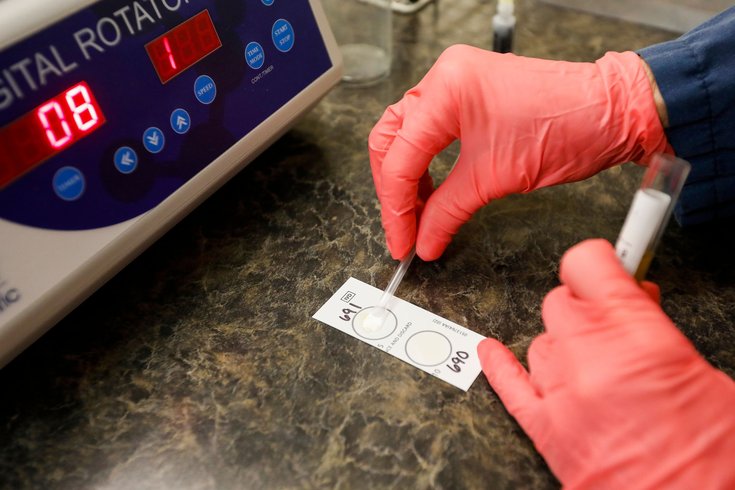
January 31, 2024
 Andrew Jansen/News-Leader/USA Today Network
Andrew Jansen/News-Leader/USA Today Network
Tests for syphilis, above, generally involve detecting antibodies in blood samples. Testing is usually available through health care providers and local health departments.
Syphilis cases have been rising at an alarming rate in the United States, according to a report from the U.S. Centers for Disease Control and Prevention.
Reported syphilis cases totaled 207,255 in 2022, the highest number since the 1950s and an 80% increase since 2018. This number includes cases of all stages of syphilis and congenital syphilis, which occurs when a mother infected with syphilis passes it to her baby during pregnancy.
As concerns for syphilis and sexually transmitted infections in general grow, here are steps individuals can take to prevent, test and receive treatment for syphilis.
There are four main stages of syphilis: primary, secondary, latent and tertiary. They each have different symptoms, and the stages may overlap, according to the CDC.
Primary syphilis produces one or multiple sores in the infection area, usually the genital area, around the anus, or in the rectum, on the lips or in the mouth. The sores last 3-6 weeks and heal regardless of whether the person receives treatment. But treatment is the only way to prevent the disease from advancing to the secondary stage.
Secondary syphilis results in a rough red or brown rash or rashes, swollen lymph nodes and a fever. These symptoms also may go away without treatment. But without treatment, the syphilis will continue advancing.
The latent stage produces no symptoms, and people can have the bacteria in their bodies for years.
Tertiary syphilis is the most serious form – though it appears in only about 30% to 40% of people who develop latent syphilis, according to the Mayo Clinic. It usually develops 10 to 30 years after infection and can result in major damage to the heart, blood vessels, brain, nervous system and internal organs. It can be fatal.
Infants with congenital syphilis may be asymptomatic at birth. Eventual symptoms may include rhinitis, jaundice, rashes and several other clinical manifestations. Congenital syphilis also can lead to miscarriage or stillbirth.
Syphilis is transmitted through direct contact with a syphilis sore during vaginal, anal or oral sex. Anyone sexually active is at risk of contracting syphilis. The primary preventative measures are the use of condoms during sexual intercourse and only engaging in intercourse with partners who have tested negative for syphilis.
According to the CDC, men who have sex with men are at higher risk of getting syphilis. The CDC recommends these men, as well as women in the early stages of pregnancy and anyone who has unprotected sex get tested regularly for syphilis.
Anyone who still has sores from syphilis are advised not to have sexual contact with any new partners and to inform any recent partners.
People can talk to their primary health care providers about testing for syphilis and other sexually-transmitted infections. In Philadelphia, Public Health Center 1, at 1930 S. Broad St., provides free walk-in STI testing.
Other partners of the Philadelphia Department of Public Health that provide free STI testing include:
• Bebashi, 1235 Spring Garden St.
• Mazzoni Center, 1201 Locust St.
• Congreso de Latinos Unidos, 216 W. Somerset St.
• Courage, 3751 Island Ave.
Philly residents can order free at-home STI tests online when supplies are available. People also can purchase rapid at-home syphilis and STI tests from pharmacies like CVS and Walgreens.
Most syphilis tests require a blood sample.
Antibiotics, primarily injections of Benzathine penicillin G, are used to treat syphilis. But the CDC cautions that treatment may not undo any damage the infection has caused.
Philly residents infected with syphilis can receive treatment from their doctors or at primary care facilities, or at Health Center 1 and the Department of Public Health's partners listed above.